#lysimachos
Explore tagged Tumblr posts
Text

Tetradrachms depicted horn of Ammon. Especially Lysimachos( Alexander head)
Apollo head , Zeus. The horn of Ammon, often associated with the diety Zeus Ammon, is a distinctive feature found on some ancient coins, particularly those from the Hellenistic and Roman periods. Zeus Ammon was a syncretic deity combining the Greek god Zeus with the Egyptian god Amun. This representation often included a ram's horn, symbolizing power, fertility, and divine authority. Also Ammon was depicted with ram's horns, symbolizing strength and divinity. This representation was adopted by the Greeks, who referred to him as Zeus-Ammon, and later by the Romans as Jupiter-Ammon. The horns were not only a religious symbol but also a mark of royal authority; rulers often depicted themselves with these horns to signify their divine right to rule. #archaeology #history #ancient #art #Caesar #ancienthistory #archaeological #rome #italy #roman_empire #roma #heritage #roman_republic #archaeologylife #Orichalcum #Roman_mythology #italia #medallion #romancoin #romanarcheology #romanancientcoins#aureus #denarius #dupondius #follis #antoninianus #sestertius #fils #alsadeekalsadouk #الصديق_الصدوق
#Lysimachos#Zeus Ammon#history#archaeology#photography#greek coins#travel#palestrina#culture#sidon saida tyre beirut phoenician الصديق_الصدوق#الصديق_الصدوق#roman coins
7 notes
·
View notes
Note
Aside from Hephaistion, who did Alexander consider to be his friends? Is there anyone who’s been noted as someone he was close to or fond of? Were they around his age, or older, like someone like Kleitus?
No doubt Alexander’s circle changed across his lifespan. Hephaistion appears to have been a constant, and a few others, but we get mention of new friends and acquaintances now and then, also fallings-out, or deaths.
First, we should note that each Macedonian prince was accorded an “official circle” called syntrophoi (σύντροφοι), selected by the king. It means “those who were raised together with,” e.g., schooled with Alexander. His cousin Amyntas would have had the same. (I’m thinking Arrhidaios probably didn’t, but he might have, depending on his actual mental capacity, which isn’t clear.)
If we can’t be 100% certain who were Alexander’s syntrophoi, we can make a few guesses. Perdikkas, Leonnatos, Marsyas, Hektor, Lysimachos, and Seleukos all seem likely—maybe even Kassandros (although he was younger). Probably Hephaistion, although one of the places Sabine Müller and I disagree is when he met Hephaistion. She thinks they met only as adults, whereas I think Hephaistion was a syntrophos. (I won’t go into why; I simply note it.)
The ruins of the palaistra near Mieza turns out to be much bigger than we expected, suggesting there were a lot of boys sent to study with Alexander—more by far than I included in the novel. But I’d already written Dancing with the Lion by the time that excavation occurred, and I’m not sure I’d change it even if I had known, as 100 kids is a lot to keep track of! I did note the size in the Historical Note, however, at the end of book 2. Obviously if there were even 50 (never mind the possible 100), they weren’t all close to Alexander. Probably most weren’t.
Some not syntrophoi, but important to his circle, include Krateros, Philotas, Nikanor, and Ptolemy, all of whom would have been about 10-ish years older, and may have been syntrophoi (at least some) of Alexander’s older cousin Amyntas. Erigyios, Laomedon, Harpalos, and Nearchos, despite my making them Alexandros’s age in the novels, were all almost certainly older, and perhaps by some years (more than Ptolemy and Krateros). Kleitos would have been like a big brother to Alexander, too, but not a syntrophos.
Now, OF those assigned syntrophoi, who were his actual friends? Good question. Keep in mind this is just my own opinion, based on my sense of things from the sources.
In addition to Hephaistion, he seems to have been genuinely fond of Hektor (Parmenion’s youngest). I think he also liked Lysimachos, and Perdikkas. Despite the hatchet-job Ptolemy (et al.) did on Perdikkas’s reputation in the Successor Wars, after Hephaistion’s death, Perdikkas occupied the highest position still at court (with Krateros his most trusted person away from court). I’m not sure if he were actual friends with Krateros, or simply recognized him as an excellent general, Parmenion’s natural successor. If they were close at some point, I can’t imagine the friction with Hephaistion made it easy to continue. For that matter, I’m not sure Hephaistion and Krateros weren’t originally at least friendly, if not friends. The tension seems to bloom late in the campaign after Hephaistion’s rise. Another possible friend was Marsyas, who had more of a literary career than a military one. But like Ptolemy later, he could have exaggerated his importance to Alexander for prestige.
There were also people in-and-out of his personal circle who weren’t Macedonians, or soldiers. We hear less about them. And we should remember that people’s personal circle does change across time. I think most people do probably count only a handful of people as consistent, long-term friends. That’s what makes them special.
Alexander’s unique place as crown prince, then king…then simply the most powerful person in his world, would have complicated enormously who he could call a friend.
It’s why I find his attachment to Hephaistion so fascinating—a unicorn—as it seems to have been both sincere and to have weathered his rise to power. It’s also why I think his own death followed so quickly on Hephaistion’s. It’s lonely at the top. A cliché, but very true. He got lucky enough to have a trusted partner who he brought along from the beginning. When that partner died, he was rudderless. Even if he trusted Perdikkas…Perdikkas wasn’t Hephaistion. Nobody was. That emotional devastation was heightened so much more simply due to his position.
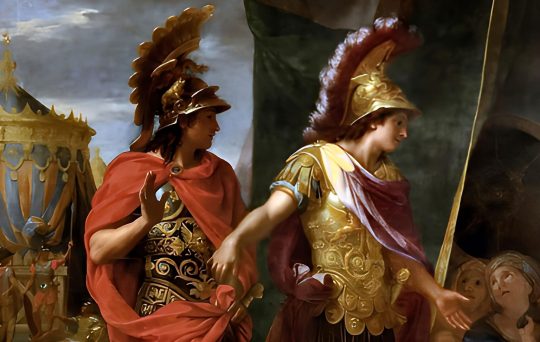
#asks#Hephaistion#Hephaestion#Alexander the Great#Alexander the Great's friends#syntrophoi#Macedonian court practice#Perdikkas#Krateros#Crateros#Leonnatos#Lysimachos#Marsyas#Hektor#Alexander's boyhood companions#Classics
47 notes
·
View notes
Text
Coin of the Day #14 (5/18/2024)
A little Thrace for Saturday…


Kingdom of Thrace
AE12 - 1.94g
Lysimachos 305-281 BC
Lysimacheia Mint
Obverse Head of Athena right, helmeted
Reverse ΒΑΣΙΛΕΩΣ ΛΥΣΙΜΑΧΟΥ
Lion head facing front
SNG Cop 1170, Mueller 12
#coin of the day#kingdom of thrace#thrace#Lysimachos#ancient greece#greek coins#coin#coins#numismatics#ancient coins
5 notes
·
View notes
Text

Tetradrachm - Ancient Greek Macedonian Kingdom, Thrace, King Lysimachus Reproduction Coin.
Obverse: diademed head of the deified Alexander right, with horn of Ammon. Reverse: Athena Nikephoros (goddess Athena of Victory) seated left, holding Nike, left arm resting on shield, transverse spear in background; Φ to outer left; to inner left, turreted head of goddess Tyche right (Smyrna mint). Diameter coin 28 mm.
#tetradrachm#coin#ancient#greek#greece#macedonian#kingdom#king#Lysimachus#Lysimachos#alexander the great#goddess athena#collectibles#coins#Thrace
0 notes
Text
Soo the name that won on my poll for the name Odysseus would rename Astyanax on my Astyanax lives au was Lysimachos...that means free from the battle...
So until i figure out a better name i will be calling this au Lysimachos au
16 notes
·
View notes
Text



Вербейник обыкновенный на берегу речного острова.
Любопытна этимология латинского родового названия вербейников — Лизимахия (Lysimachia). Оно дано по имени Лисимаха (род. ок. 360 г. до н.э.) — военачальника и телохранителя Александра Македонского, впоследствии правителя Македонской Фракии. По утверждению Плиния, Лисимах первым нашёл и описал вербейник.
Lysimachia vulgaris on the shore of a river island.
The etymology of the Latin generic name of loosestrife - Lysimachia (Lysimachia) is curious. It is given by the name of Lysimachos (born c. 360 BC), the military commander and bodyguard of Alexander the Great, later the ruler of Macedonian Thrace. According to Pliny, Lysimachus was the first to find and describe loosestrife.
#русский tumblr#россия#лето#природа#июль 2023#солнечный день#зеленая природа#лес#река#цветы#вербейник#макрофото#мои фото#russia#summer#july 23#nature#nature photography#greenery#forest#river#lysimachia#flowers#my photos#beauty of nature#original photography#photographers on tumblr#macro photography
133 notes
·
View notes
Text
"There is one clear early Hellenistic example of a regnant basilissa: Amastris, who ruled Herakleia Pontika after the death of her husband, its tyrant Dionysios. She eponymously founded the neighboring city of Amastris c. 300 BCE, and from there issued coins bearing the legend “of basilissa Amastris" (ΑΜΑΣΤΡΙΟΣ ΒΑΣΙΛΙΣΣΗΣ). Like many other women ruling as monarchs, Amastris came into direct power because her husband had died and her sons were under age. She brought her own royal credentials to the situation, however, as a niece of Dareios III (daughter of his brother Oxyathres). Like Apama, Alexander had married her to one of his generals (Krateros). After 323 Krateros swapped her for Phila, and she moved to Herakleia to live with Dionysios, who, as Memnon tells us later (probably after 306), began to call himself basileus. Although supervising the regency for her sons, Amastris faced interventions by Antigonos Monophthalmos, ostensibly on the children’s behalf, to control Herakleia, and then by Lysimachos, who also married her. By 300 she was solo again with no outside interference, and her foundation of Amastris marks the point when she fully embraced the role of a regnant basilissa. Although her sons soon came of age, she maintained this role until they assassinated her c. 284."
-Gillian Ramsey, "Apama and Stratonike," "The Routledge Companion to Women and Monarchy in the Ancient Mediterranean World" (edited by Elizabeth D. Carney and Sabine Müller)
16 notes
·
View notes
Text

"Alexandros" by Yoshikazu Yasuhiko
This is a great manga! The story opens with the Battle of Ipsus and the recollections of the aged Lysimachos. Such stories may be rare.
In Japan, fiction about Alexander is more interesting in manga than in novel, including Japanese translations. Alexandros, Historie…
Hephaistion in this manga is an ordinary guy but very handsome and charming and I got to know him in this manga. In Japan, there are other avenues to like Hephaestion besides Oliver Stone's Alexander and Mary Renault's novels lol.
Other than him, Alexander's generals are also very charming! Especially Ptolemy, Seleukos and Lysimachos. They look a lot like their statues.
Probably there is no English translation, but the painting alone are worth seeing. Please read it!
#ancient history#ancient greece#ancient macedonia#alexander the great#hephaestion#hephaistion#yoshikazu yasuhiko#history#manga#hellenism#japanese manga
63 notes
·
View notes
Photo

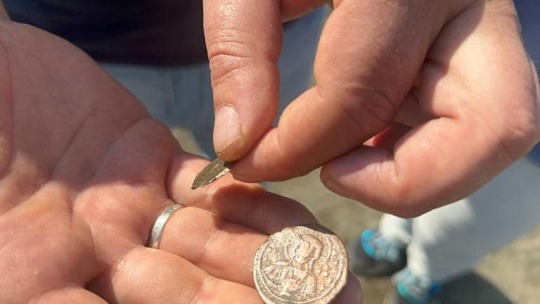
2,000-Year-Old Coins Surface with Lake Iznik withdrawal in Turkey
With the withdrawal of Lake Iznik in the northwest of Türkiye, the ancient coins found at the bottom of the water began to be found by the locals.
In Iznik, the world-famous historical city of Bursa, which is on the temporary heritage list of UNESCO and expected to enter the main list this year, a couple walking on the shore of Lake Iznik found a 2,000-year-old historical coin.
Locals began discovering ancient coins after the lake dried up, possibly from the historical basilica that was once submerged beneath Lake Iznik but rose above the water in 2014.
Ismail Yıldırım, walking with his wife and children, noticed that the coins were historical as the cash had figures of Jesus and relief inscriptions.
The Yildirim couple handed over the coins to Iznik Archeology Museum. The museum officials, who examined the coins, stated that the coin, which is the figure of Jesus Christ, belongs to the 9th century, and the other coin belongs to the Hellenistic period.
Iznik, a district of northwestern Bursa province dating back to the 4th century BC, is significant for both Muslims and Christians, with many sites from the era of Bithynian, Roman, Seljuk, and Ottoman civilizations.
According to geographer Strabo, the ancient town was founded in 316 BC by Antigonos, the commander of Alexander the Great (356-323 B.C). It is also reported that Lysimachos, another general of Alexander, took the city and renamed it after his wife Nicaea.
İznik enjoyed a period of expansion and prosperity under Roman rule.
During the Byzantine period, İznik grew in importance as a religious center, especially after Emperor Constantine converted to Christianity in 313 AD. The first Christian Council, known as the Great Council of Nicaea, was held in 325 AD in İznik, with the participation of over three hundred bishops from various parts of the empire.
By Oğuz Büyükyıldırım.
#2000-Year-Old Coins Surface with Lake Iznik withdrawal in Turkey#jesus christ#collectable coins#ancient artifacts#archeology#archeolgst#history#history news#ancient history#ancient culture#ancient civilizations
29 notes
·
View notes
Text
Welterbe (auf)gespürt und (er)fahren – TR – Ephesos
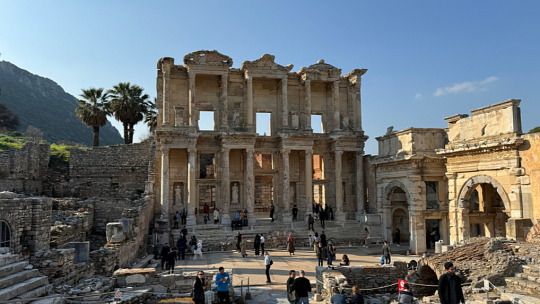
Ephesos war ein faszinierendes Zentrum der antiken Welt, das ein reiches kulturelles, religiöses und historisches Erbe hinterlassen hat. Seit 2015 steht die antike Stadt als eine der wichtigsten archäologischen Stätten der Welt auf der UNESCO-Welterbeliste. Durch seine Lage an der Ägäis war Ephesos ein wichtiger Hafen für den Handel zwischen Ost und West. Aufgrund der Versandung kam es zu Verschiebungen der Küstenlinie, was zu mehreren Verlagerungen der Stadt führte. Die letzte wurde im vierten Jahrh. v. Chr. von Lysimachos, einem der zwölf Generäle Alexanders des Großen, gegründet und 133 v. Chr. zur Hauptstadt der neuen Provinz Asien bestimmt. Mit dem Rückgang des römischen Reiches und der weiteren Versandung des Hafens begann der Verfall der Stadt, bis sie schließlich im 15. Jahrh. von den Türken erobert und verlassen wurde. Ausgrabungen in den letzten 150 Jahren haben hier großartige Denkmäler aus der römischen Kaiserzeit ans Tageslicht gebracht, darunter die Celsus-Bibliothek, eine der größten Bibliotheken der Antike, das Hadrianstor und das Große Theater sowie reich verzierte Wohnhäuser. Ephesus ist heute ein außergewöhnliches Zeugnis für die kulturellen Traditionen der hellenistischen, römischen Kaiserzeit und der frühchristlichen Zeit. Das im 2. Jahrtausend v. Chr. geschaffene Heiligtum der ephesischen Artemis, war eines der größten und mächtigsten Heiligtümer der Antike. Vom berühmten Tempel der Artemis, einem der „sieben Weltwunder“, das Pilger aus dem gesamten Mittelmeerraum anzog, sind nur noch wenige Überreste zu sehen. Im 5. Jahrh. wurde der Artemis-Kult von der christlichen Wallfahrt zur Marienkirche und zur Johannesbasilika abgelöst. Ich habe Ephesos im Rahmen einer geführten Rundreise besichtigen können. Am einem früheren Standort der Stadt sind die Ruinen des Artemis-Tempels zu sehen. Er war einst mit 115 m Länge und 55 m Breite der größte griechische Tempel der Welt. Jede seiner 127 Marmorsäulen wog 20 Tonnen. Bei Ausgrabungsarbeiten wurde eine gefunden und wieder aufgerichtet. Im Hintergrund steht die Johannesbasilika, zu der noch heute viele Pilger kommen.



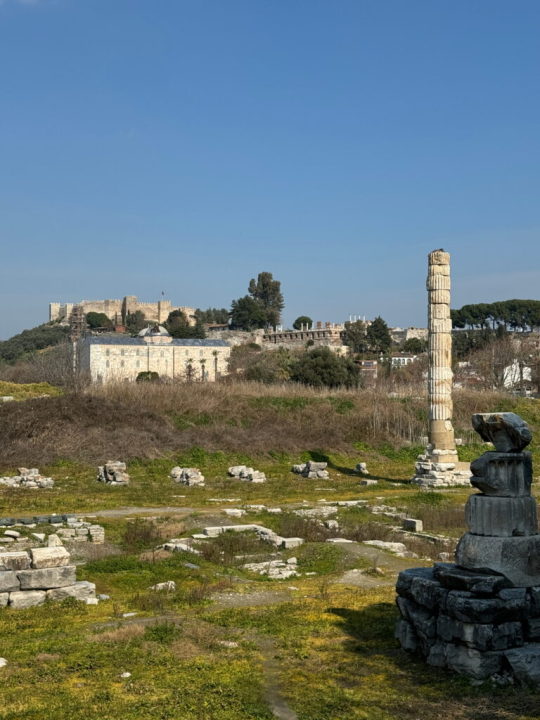

Das große Ausgrabungsgelände umfasst eine gesamte Stadt. Bildquelle: https://www.ephesus.co/ephesus-map.htm Vorbei an Bädern, dem Odeon und Tempelruinen, führt die mit verzierten Säulen und Skulpturen geschmückte Kuretenstraße hinunter zum alten Stadtzentrum.


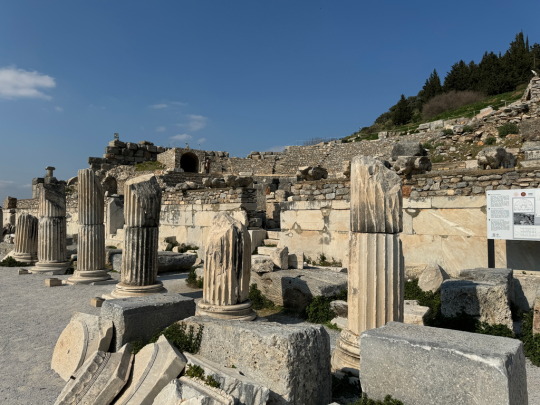

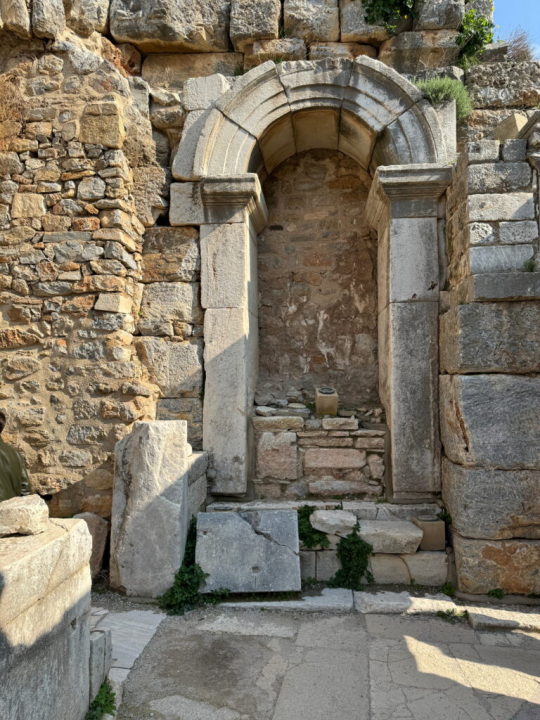
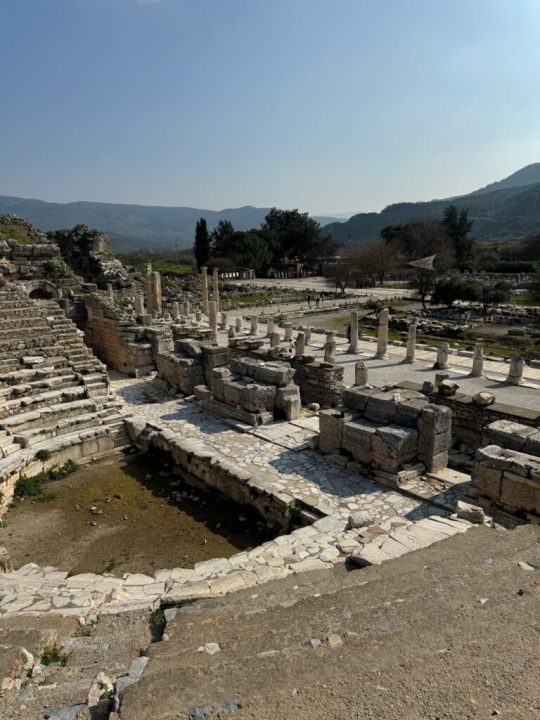
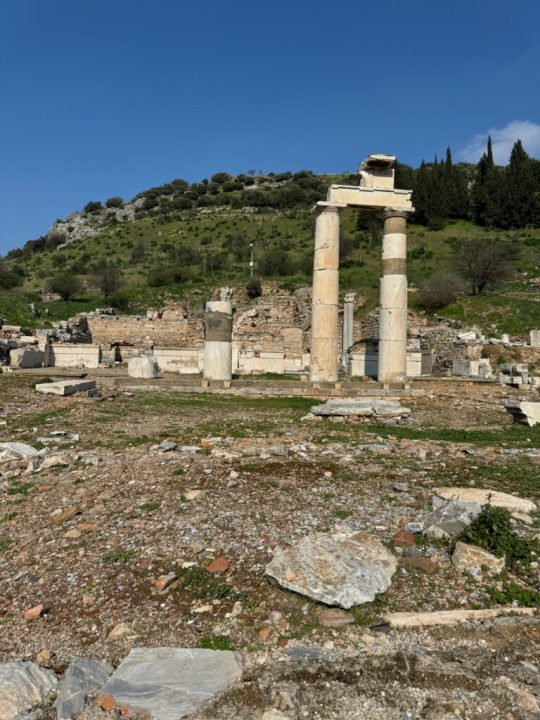
Die antike Shoppingmeile war mit schönen Mosaikböden ausgestattet, mit Reliefs, Skulpturen und Brunnen geschmückt und von Arkaden überdacht - da hat sich im Laufe der Jahrhunderte gar nicht so viel geändert.

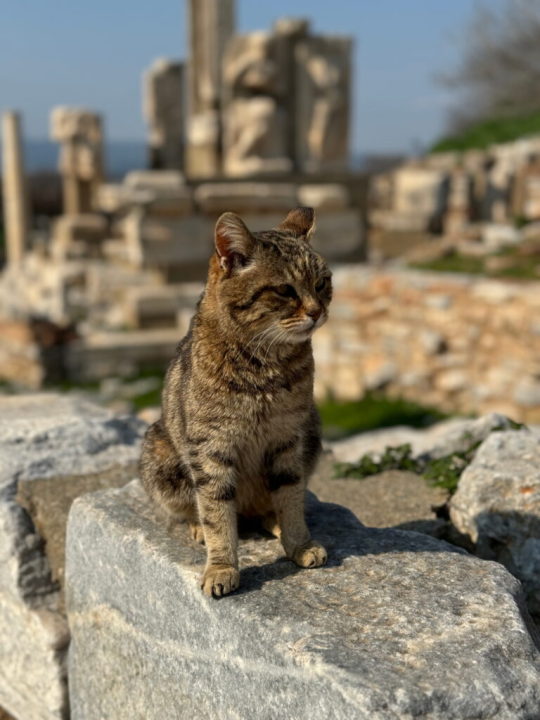

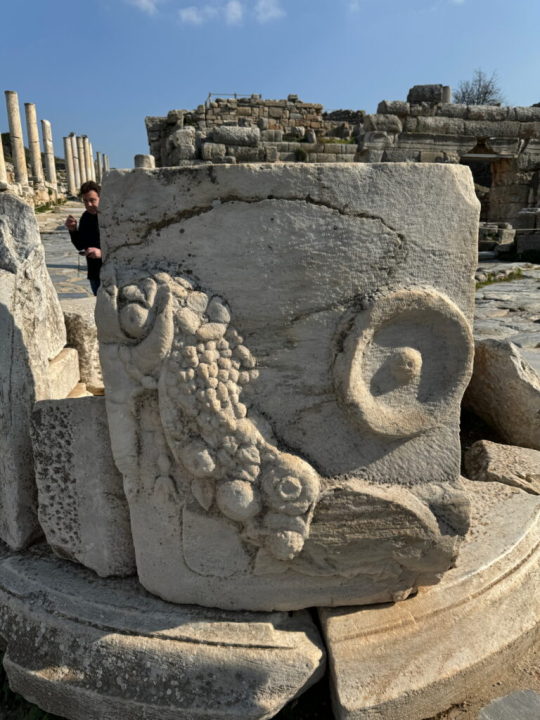


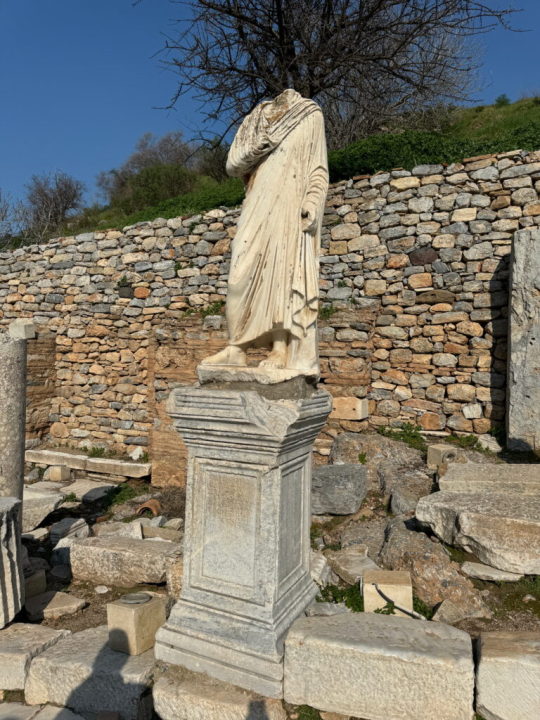
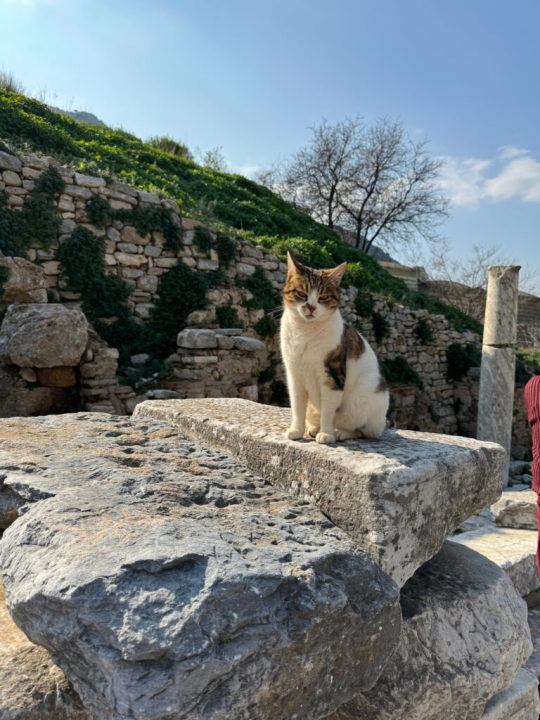
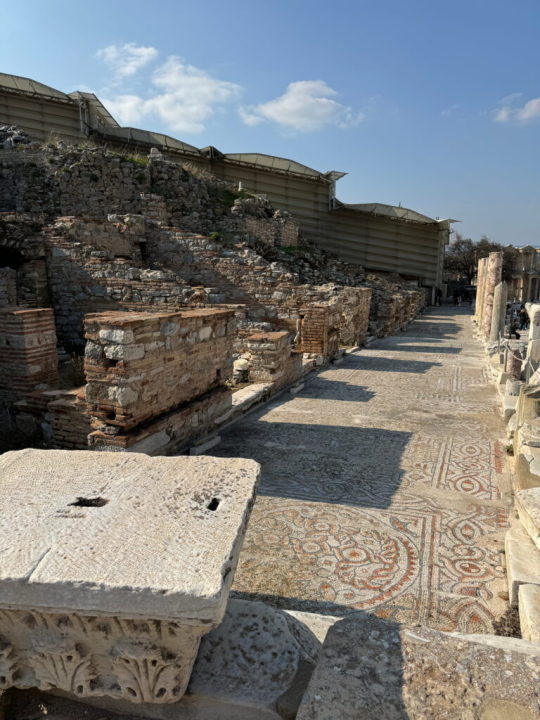


Entlang der Straße den Hang hinauf stehen Wohnhäuser. Einige wurden ausgegraben und die Mosaike freigelegt. Man kann sie in einer Extra-Ausstellung besichtigen. Der wunderbare Hadrianstempel und ein wenig entfernt das Relief der Nike sind ein Blickfang im Zentrum der Stadt.

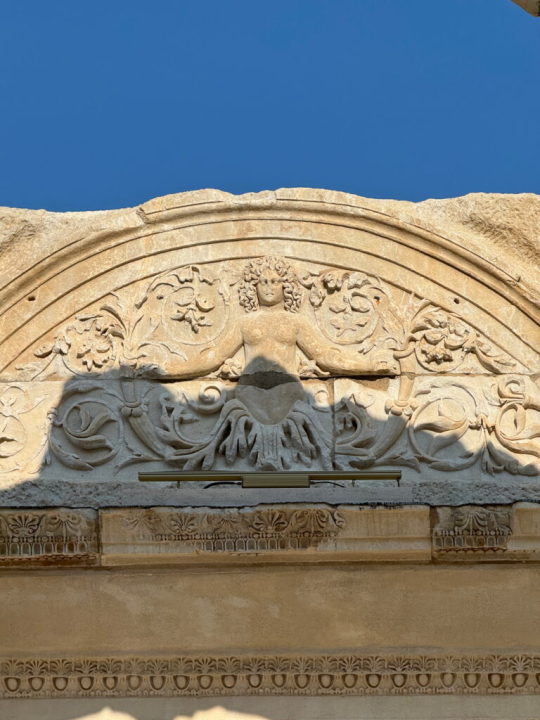
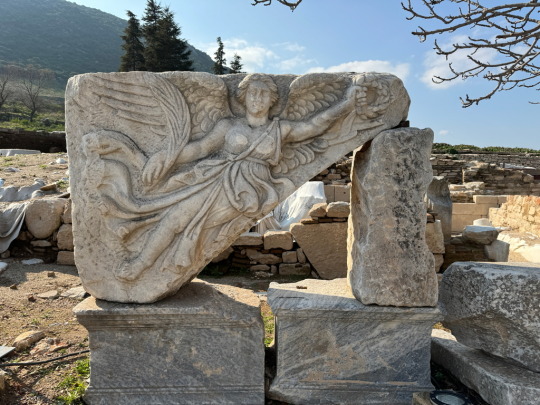
Wenig später und schon von Weitem sichtbar - das Highlight von Ephesos und der Hotspot der Selfies - die Celsus-Bibliothek. Sie ist ein wahrhaft magischer Ort.

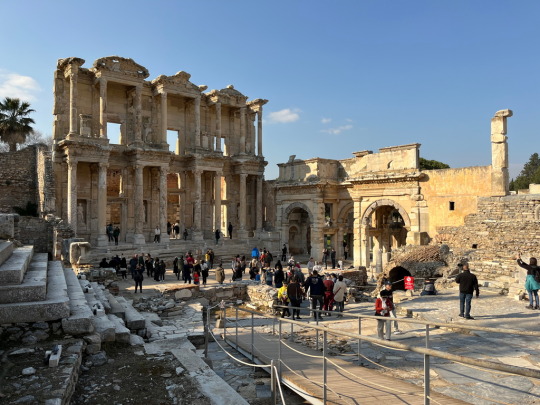

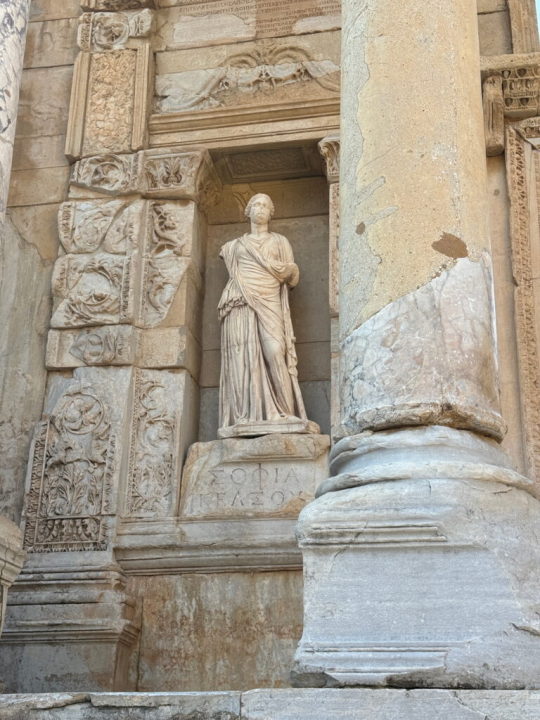
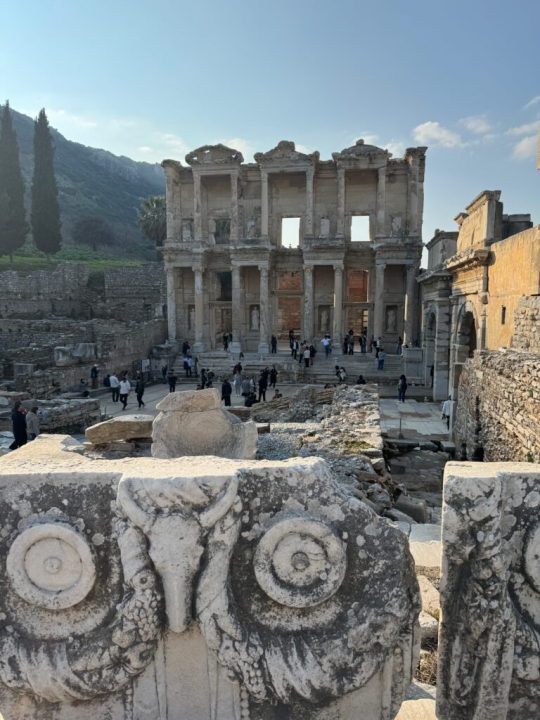
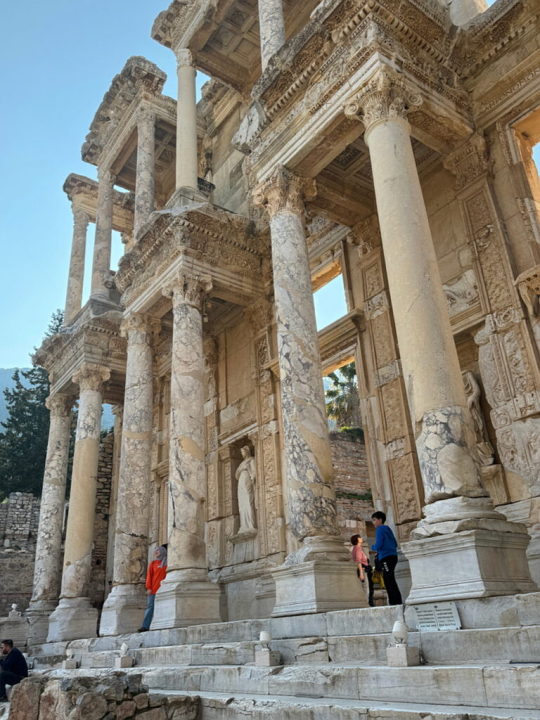
Der nächste Höhepunkt ist das große Theater. Von den oberen Rängen hat man einen fantastischen Blick über die Stadt. Hier finden in den Sommermonaten Aufführungen und Konzerte vor historischer Kulisse und mit perfekter Akustik statt.

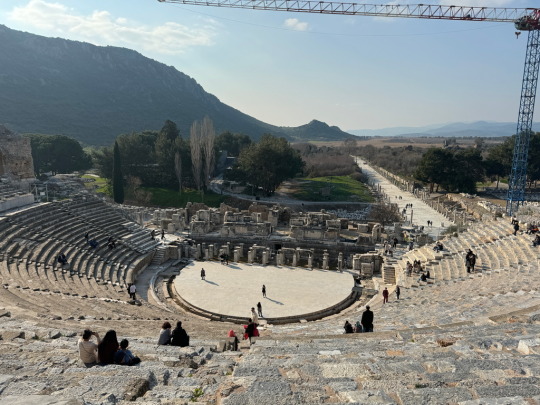
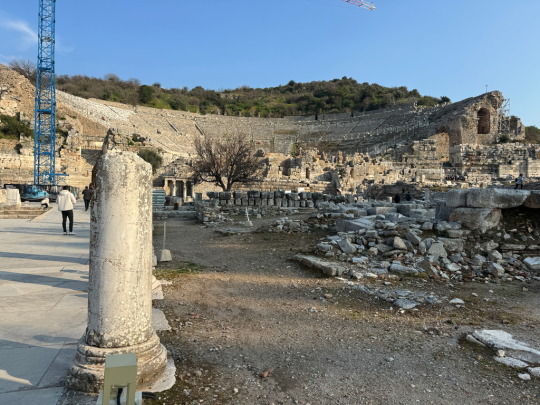
Auch wenn man viel Zeit eingeplant hat - sie wird nicht ausreichen, um Ephesos wirklich zu erkunden und die vielen Schätze zu sehen. Aber man kann die Atmosphäre der Stadt spüren und in Gedanken eine Zeitreise machen.

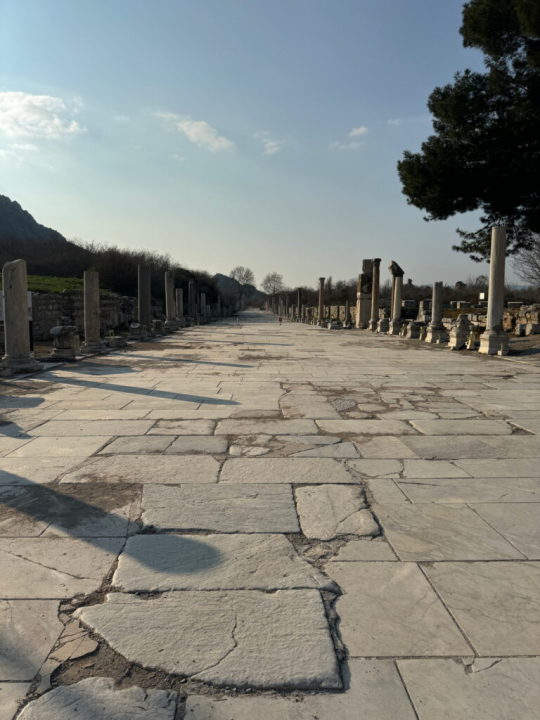



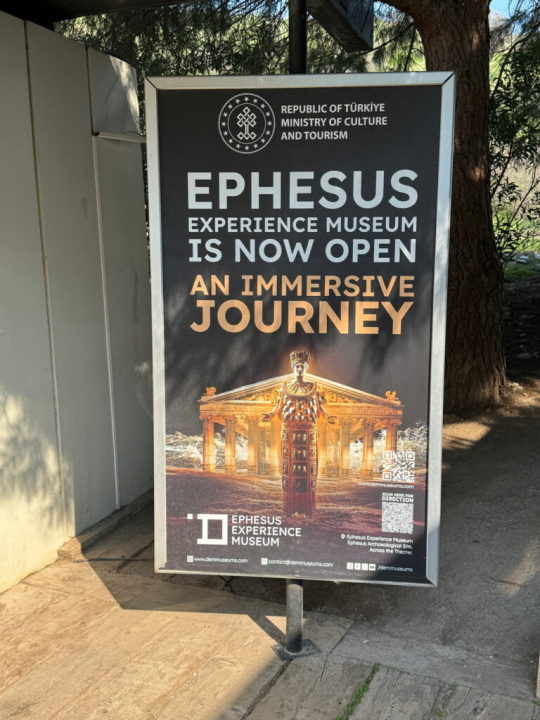
Eine multimedial unterstützte Zeitreise bietet seit Kurzem eine (nicht ganz preiswerte) neue Show auf dem Grabungsgelände.
Resümee
Ephesos ist eine Ausgrabungsstätte der Extraklasse und ein ganz besonderer Blick in die Vergangenheit. Die antike Stadt ist heute noch lebendig. Wenn man durch die Straßen geht, zwischen all den Schätzen oder in der großen Bibliothek steht und Stimmung lauscht, fühlt man sich um tausende Jahre zurückversetzt und kann in das antike Leben eintauchen. Read the full article
#Ägäis#Besichtigung#Ephesos#Erfahrungsbericht#Erkundung#Europa#Inspiration#Reisebericht#Reisefotografie#Reisetagebuch#Reiseziele#RSD-Studienreise#Rundfahrt#Rundreise#Sehenswürdigkeit#Städtereise#Türkei#UNESCO-Welterbe#unterwegs#Urlaubplanen
1 note
·
View note
Text
Was reading Mary Renault's fire from Heaven( had to put it on hold, I need to know more about Greece at that time before continuing with this one) and he's calling his teacher(?) Lysimachos, Phoenix like Achilles' Phoenix.
In this kid Alexander says, "he'd have went to war if Lysimachos asked him" ( that council where Phoenix tried to make Achilles fight in the war again, told him story of Cleopatra and her husband (don't remember his name rn fuck) and Achilles didn't listen, didn't budge)
Achilles and his Phoinix (the nickname had stuck at once) had the threshold of Olympos, and the sights of the festival, to themselves. Phoinix had given Achilles his own Iliad, a secret from Timanthes.
Fire from heaven, Mary Renault.
the way Alexander the Great literally just kinned Achilles a little too hard? Like that’s all it was?? He read the Iliad and based his entire personality on Achilles like “yup! he’s me! going to conquer SO MUCH LAND NOW AND BE THE GREATEST WARRIOR😼😼😼😼”
44 notes
·
View notes
Note
Going through other classical fan’s blog on here, I saw one person put forward a theory that Hephaestion was erased from history due to his excessive cruelty, such as him torturing Philotas. Could there be any truth in that? Was Hepheastion uniquely cruel as he became more powerful in Alexander’s empire?
The Problem with Hephaistion’s Erasure
…is that he wasn’t erased. (Or not until later.) It’s perception more than a reality. He actually has quite a bit of mention in Curtius, Arrian, Diodoros, and Plutarch—as much (or more) than any of the other younger marshals during Alexander’s lifetime. This reflects what was present in the now-lost sources written during ATG’s career or in the generation after his death (Kallisthenes, Kleitarchos, Ptolemy, Aristobulos, Marsyas, Nearchos, Onesikritos, etc.).
Yet the notion that he was erased from the historical record is a common one. When I first arrived at Penn State and announced that I wanted to do my dissertation on Hephaistion, Gene Borza told me, “I don’t think there’s enough information in the ancient sources to support an entire dissertation on him, even as a court study.” Then, that very summer, Gene reread the ancient sources for a project of his own, and next fall, he admitted (with some surprise), “He’s in the sources more than I realized.”
(I bit my tongue on, “I told you.”)
So, what’s going on here?
First, Hephaistion didn’t outlive Alexander. Maintaining his memory was not particularly useful to any of the surviving marshals/Diadochi, except maybe Perdikkas, who inherited his position. Yet, like Leonnatos and Krateros, Perdikkas also died (relatively) early in the wars, and the Successors who outlived him (e.g., Ptolemy, Antipatros, Antigonos, Lysimachos, et al.) blackened Perdikkas’ memory.
Ergo, Hephaistion fades into the background until appropriated later by Hellenistic- and especially Roman-era rhetorical schools as part of popular anecdotes and topoi (conventional tales or themes) about Alexander.
Do you know HOW many times the “He is Alexander, too?” story appears? Sometimes positively, occasionally negatively. Same with Hephaistion reading (beside Alexander) a letter from Alexander’s mother. He also gets trotted out frequently as an example of Alexander’s lack of self-control, given the king’s “excessive” grief at his death (which seems to grow with each retelling).
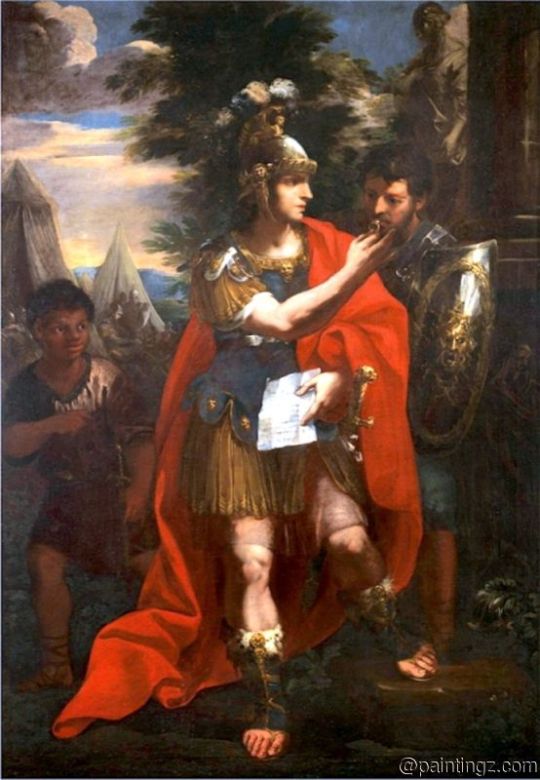
Yet NONE of those has to do with his role as chiliarch or his military accomplishments. Also, in Plutarch—probably the most popular history of Alexander*—we find nothing about Hephaistion as a commander, and little about politics. Plutarch tells us the king sent Hephaistion a little dish of smelts (or sardines); that Hephaistion and Krateros got into it with swords; that Hephaistion blamed Kallisthenes for the failure of the proskynesis banquet; that he ate a whole boiled fowl and drank a pitcher of wine on the morning of his death; and that Alexander called him Philalexandros. But if Plutarch were all we had, you’d never know Hephaistion was named chiliarch!
It’s largely the personal that came down to later historians…and movie-makers like Oliver Stone (or Netflix, even when their Hephaistion historian tells them to give him more to do; at least he got to intrigue with Mazaeus). One must go to the original histories and start making lists to realize just how much Hephaistion appears, particularly post-Baktria.
The man did have a career apart from being the king’s bosom buddy. 😒
As for whether he was exceptionally cruel, three problems complicate determining that: 1) biases in the sources, 2) biases of the people who knew him, and last, 3) simple cultural differences.
Let’s start with the last, as it’s mentioned in the ask. Hephaistion was one of three marshals who interrogated Philotas. To modern readers, use of torture strikes as horrific (as well it should). But in the ancient world, torture during questioning was standard, for some. A slave’s testimony wasn’t even admissible in court unless given under torture. (Otherwise, they believed a slave would lie to save their master.) Torture of arrested (lower-ranking) soldiers in military camp was also the norm, especially by the Roman era.
It’s not the torture itself that’s shocking. It’s who it was performed on: a high-ranking member of the Hetairoi. Arrian glosses over the whole thing because Philotas (Parmenion’s son) was tortured, not because torture was employed.
Also, there were three of them: Krateros, Hephaistion, and Koenos, Philotas’s brother-in-law, who didn’t want to go down with the ship so needed to distance himself (emphatically). Plutarch has Philotas, during the torture, beg Hephaistion for pity, while Alexander listens behind a curtain. Yet Plutarch’s point is what Alexander says regarding Philotas’s lack of fortitude—not who Philotas appealed to. We absolutely cannot trust details like this in Plutarch’s anecdotes! He changes out players, and details, as it suits him. Philotas’s supposed appeal to Hephaistion quite probably didn’t happen.

But did Plutarch make Philotas beg Hephaistion in order to increase the reader’s impression of Hephaistion’s cruelty? Maybe. Yet in Plutarch’s version, it’s Krateros who’s the snake in the grass and out to get Philotas. So perhaps Plutarch is trying to imply Hephaistion was the soft-touch among the three. Despite Plutarch’s overall portrait of Hephaistion, I’m inclined to read it as the latter here. (For my article on the whole Philotas Affair.)
Still, it’s a good example of why just reading these stories and interpreting them with modern sentiments can (sometimes) result in serious misunderstandings.
The other two problems both concern bias, albeit among different groups.
As I just alluded to, our sources paint different portraits of Hephaistion. Plutarch probably has the most “negative” picture, and Curtius the most “positive.” Diodoros and Arrian are more neutral (but sometimes deceptively so, at least in Arrian). From positive to negative, I’d rank them: Curtius, Diodoros, Arrian, Plutarch. (Hephaistion’s barely in Justin, so I ignore him.)
Outside these histories, particularly in Roman rhetorical exercises, Hephaistion appears only in relation to Alexander. By then, he’d become a symbol, not an officer or even much of a person. Just Alexander’s echo: “Alexander too.”
Last, we have the biases of those who knew Hephaistion. I already noted that enshrining his memory was not particularly useful to the Diadochi, so they didn’t. Others may also have had reason to bad-mouth him. But not all, or we wouldn’t have the nicer assessments such as Curtius’s assertion that he was charming and didn’t push his place.
By the end of his life, he was Alexander’s righthand man with loads of power. That’s going to make enemies, and there were men at court afraid of him. Why isn’t clear. Was he fearsome because he was cruel and arrogant, or because he had the authority to break a man’s career (just as did the king)? It seems many of the people who were afraid of him (or disliked him) also feared Alexander. Except Krateros, who’s a special case.
Leaving him aside, we know Hephaistion also quarreled with Eumenes … but so did a lot of people, including rather infamously Antipatros. (Eumenes was also friends with Krateros.) Similarly, Arrian (7.18.1-5) relates that a certain Apollodoros told Alexander (in Babylon) about bad omens concerning him. But first, Apollodoros had asked his brother (a Seer) to sacrifice about Hephaistion, because he feared him. His brother said the omens were bad and sure enough, Hephaistion died shortly after. So Apollodoros asked his brother to sacrifice about Alexander, because he also feared him … bad again. Curiously, Apollodoros told Alexander, and got a pardon for his honesty.
Arrian recounts the story as part of his list of bad omens for Alexander in Babylon, so we’re not told why Apollodoros feared the two but may hazard a guess. Arrian sets the warning in Babylon, but most of the events predated that, going at least as far back as Ekbatana, and likely earlier.
Upon his return from India, Alexander had engaged in a lot of “house-cleaning.” Curtius (and Arrian, et al.) present him as exceptionally savage to some of those left behind to mind the store while he was away in the East. He removed them from their positions and even executed several—all based on negative accounts of their behavior in his absence, milking the populace and such. He supposedly didn’t give these noblemen a fair chance to defend themselves because he’d become easily swayed by flatterers and other courtiers with grudges (and—so Curtius—one of them was even, horrors!, a eunuch). There’s a LOT of Roman anxiety about imperial purges under this, as well as the standard template of growing tyrannical behavior that would (of course) result from Alexander’s Orientalizing.
So, we must interrogate the texts as to whether Alexander was unfairly harsh, or these men had earned their punishment. Even if Apollodoros told Alexander about the omens, it may have been to save his own neck by showing he’s really a “good guy after all.”
The negative press about Hephaistion all arises once he gained power and authority. Perhaps that’s because it went to his head, and he attacked his enemies. But it’s equally possible he went after wrong-doers in the name of the king, and they didn’t like it. After he was dead (and so was Alexander), those people got revenge with a poison pen, like Ephippos of Olynthos.
It might also be a bit of both the above. After all, in ancient Greece and Rome a moral man helped his friends and actively sought to hurt his enemies.
The upshot remains: we just don’t know what Hephaistion was like as a person. Curtius describes him as charming. Plutarch’s portrait is more hostile, but even that isn’t unmitigated. We’re reduced to “hints and allegations.” More specificity about him is what fiction is for. 😉
—————-
* Plutarch’s popularity owes to four things. His Life of Alexander is shorter than Arrian, Curtius, or Diodoros. It’s also heavily focused on personality and anecdotes, which are intrinsically more interesting to the average reader. Thid, it was more readily available than most others (even Arrian). Last, his Lives all lend themselves to reuse in sermons/etc. as moral lessons. A number of the stories that people know best about Alexander come from Plutarch.
#asks#Hephaistion#Hephaestion#Alexander the Great#Hephaistion as chiliarch#ancient Macedonia#ancient Greece#Classics#Hephaistion's personality#tagamemnon#Plutarch#Arrian#Krateros#Eumenes#alexander x hephaestion
23 notes
·
View notes
Text
Coin of the Day #27 (5/31/2024)
How about a nice Greek coin to close out May…


Kings of Thrace
AR Drachm - 18mm 3.98g
Lysimachos 301-281 BC
Kolophon Mint
Obverse Head of Herakles right, wearing lionskin
Reverse ΒΑΣΙΛΕΩΣ ΛΥΣΙΜΑΧΟΥ
Zeus Aëtophoros seated left, lion above crescent right, pentagram below throne
Price L28
#coin of the day#kingdom of thrace#thrace#lysimachos#ancient greece#greek coins#coin#coins#numismatics#kolophon#ancient coins
1 note
·
View note
Photo

Alexander the Great Tetradrachm Coin King Lysimachus Greek Ancient Coin Goddess Athena Winged Nike Macedonian Kingdom Greece Reproduction.
https://lotoumpas.ecrater.com/
#ancient#coin#alexander#great#alexander the great#gioddess#athena#winged#nike#tetradrachm#king#lysimachus#lysimachos#macedonia#macedonian#kingdom#greek#greece
0 notes
Text
With vengeance saga out obviously i got more inspired to my Lysimachos au....
4 notes
·
View notes
Photo

Say hello to my new OC Lysimachos who is a half gorgon
5 notes
·
View notes